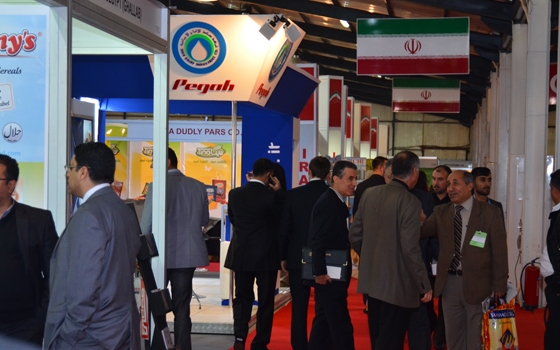Iraq imports 80 percent of its food needs and its agro-food sector is growing at 25 percent a year, making it an attractive market for international sellers taking part in Iraq Agro-Food 2013 exhibition in Erbil.
“We’ve been selling in the Iraq market for over 10 years, but we want to further increase our presence,” said Volkan Kekevi of Turkish Poultry, which represented 250 companies from Turkey and enticed visitors all day with samples of their chicken and egg dishes, cooked by Turkish chefs brought in for the occasion.
“The Kurdistan region is our number one target; last year 85 percent of all Iraq sales were in the Kurdistan Region,” Kekevi said.
Although the November 18-21 exhibition, now in its sixth annual edition, targets all of Iraq, its main market is the autonomous Kurdistan Region, whose stability and booming economy attract foreign firms interested in the local or larger Iraqi market.
The fair is among the most important and well-established of its kind in the region, bringing the latest agro-food products and technologies to clients in the Kurdistan Region and Iraq.
With a rising population of about 3 percent annually and with increased household expenditure, Iraq’s agro-food sector is growing at a rate of 25 percent annually.
Exhibits at the expo include agricultural equipment; food processing and packaging equipment; fresh, canned, dry and frozen foods; meat, fish and dairy products; irrigation systems and seeds, to name but a few.
Forecasts for Iraq and the Kurdistan Region indicate that demand will continue to outpace food production in coming years, perpetuating the reliance on food imports.
Essential food imports in Iraq include meat, cereals, cooking oil, canned and processed food fruits and vegetables, dairy products, nuts, dried fruits and bottled water.
Iraq’s agricultural sector is in shambles. Agriculture in the rich Kurdish lands in the north was destroyed by decades of Saddam Hussein’s attacks on the Kurds.
In the Kurdistan Region, a growing economy and more disposable income provides a market for imported processed foods, from potato chips and soft drinks to canned tuna fish and pasta.
One of the most popular exhibits on the opening day of the expo was Trade House Baltic Sea from Latvia. Botan Ali, company representative, said their products were a hit because people have never seen this kind of food before in the Middle East.
“Until now, this food has only been sold in Europe and Russia. We’re presenting nine different fish products, three different meat products, six different breads and a wheat juice, all unique to Latvia,” Ali explained.
Ali Nabeel, representing Luna, a Saudi Arabian canned and processed goods company, said the country has amped up production of processed goods in recent years.
“The processed food industry in Saudi is picking up as the country attempts to diversify its economy away from relying solely on oil,” Nabeel said. Currently, Luna has a large presence in the other Gulf Countries, Egypt, Jordan, Sudan and Somalia and is trying to increase their share of the market in Iraq.
Abdel Rahman, a local businessman, said he came to Agro-Food 2013 to get new ideas and contacts for his business, but said he felt the exhibition last year had more to offer.
Ziya Ertekin, a purchasing manager at Erbil’s Divan Hotel, said he came to source new suppliers because the market in Iraq and the Kurdistan Region is still very narrow. “I buy food products daily and want to contact the source directly and not work with third parties,” he explained.
Ertekin said he was overall pleased with the exhibits, but noted it could have been better laid out. “I wish they separated the packaging displays from the food to make it easier to visit the appropriate exhibits more efficiently,” he noted.
The annual exhibition was first held in 2008. Since its inception, the participation of local and international agriculture and food experts has grown markedly.
EIN News
21 November
























































